NATURE FOR THE VERY YOUNG
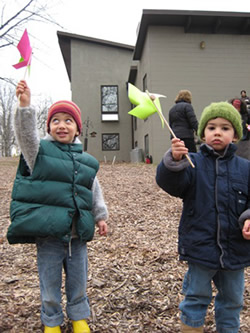 The Schuylkill Center is pleased to present another season of programs designed specifically for toddlers and pre-schoolers to engage in nature activities with their parents.
The Schuylkill Center is pleased to present another season of programs designed specifically for toddlers and pre-schoolers to engage in nature activities with their parents.
Why study nature with toddlers and preschoolers? Positive interactions with the natural environment are an important part of healthy early childhood development. These experiences can enhance learning and elicit a sense of wonder and joy from young children. These experiences also play a critical role in shaping lifelong attitudes, values, and patterns of behavior toward nature.
During the first 3 years of life, children experience the world in a more complete way than children of any other age. The brain takes in the external world through its system of sight, hearing, smell, touch and taste. This means that a toddler’s social, emotional, cognitive, physical and language development are stimulated and fostered during multisensory experiences. Nature is one of the best multisensory ‘classrooms’, building on this natural inclination and need that young children have: it invites them to touch, to smell, to explore, and to run. Rather than books and lectures, nature itself is children's best teacher. Children can interact with nature on a very basic and elemental level and make very real connections to their lives and relationships. It is a very concrete experience which is one of the requirements for learning in early childhood education.
John Burroughs cautioned that, "Knowledge without love will not stick. But if love comes first, knowledge is sure to follow." Children's emotional and affective values of nature develop earlier than their abstract, logical and rational perspectives. By allowing children to develop their love for the Earth, we can then feel confident when we ask them to save it. The more personal children's experience with nature, the more environmentally concerned and active children are likely to become.
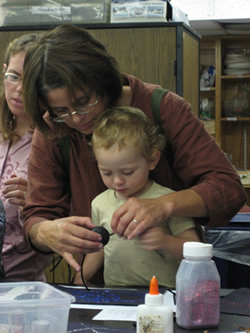
Direct experience with natural elements is only part of the story. It is important that parents and other adults in mentoring roles share and interpret with children their positive connections with the natural environment. The most inspiring essay about this crucial role of adults is The Sense of Wonder written in 1956 by Rachel Carson. She summarizes: ‘If a child is to keep alive his inborn sense of wonder...he needs the companionship of at least one adult who can share it, rediscovering with him the joy, excitement and mystery of the world we live in’ (Carson, 1998, first published 1956, p. 55).
Experiencing nature doesn’t end with the toddler and preschool experience. Here at The Schuylkill Center for Environmental Education, students from the Green Woods Charter School continue the sensory lessons they learned as toddlers and preschoolers. Kindergarten students put on their boots and wade through the stream looking for macro invertebrates. They feel the temperature of the water and measure stream flow through their tiny fingers. They walk along the stream bottom and notice the variety of sizes of rocks from pebbles through boulders and pick up these stones looking for creatures living underneath. They count the number of legs and tails that each creature has and match them with the dichotomous key that scientists use. What better way is there to study the stream? When students are lectured to, they only retain 5% of that knowledge on average. When they ‘practice by doing’ the retention rate climbs to 50 %. Tactile experiences will stick with them for many years. So give your children a great start. Go outside with them as often as you can and guide them in their exploration of the wild world.
2008 Fall/Winter, NATURE FOR THE YOUNG PROGRAM SERIES
$6 members/$8 nonmembers
Please pre-register by calling 215-482-7300 x 110.
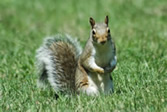
Friday, Nov. 7th
1:30 P.M.-3:00 P.M.
Squirrel Stash!: Squirrels are very busy this time of year scurrying to and fro. Just why are those squirrels so busy? Learn about the lives of squirrels and just how important they are as the farmers of the forest. We’ll go on a hike to see if we can find some squirrely hiding places.
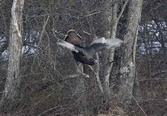 Friday, Nov. 14th
Friday, Nov. 14th
1:30 P.M.-3:00 P.M.
Wild Turkeys!: Its turkey time at the Schuylkill Center. These creatures have been to known to roam the trails. Learn a little bit about these elusive birds and create a stunning turkey centerpiece to decorate your home. Your little ones will gobble this up!
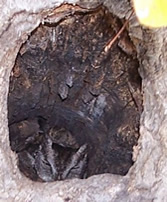
Friday, Dec. 5th
1:30 P.M.-3:00 P.M.
Home Sweet Home: Brrr.. its cold outside! It days like these when we are so thankful to have a home that we snuggle in with our families. Do animals have homes to? Check out some animal shelters with us and then use natural materials to create some imaginative shelters of your own.
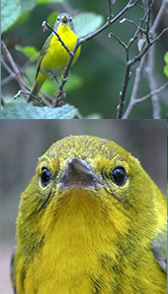
Friday, Dec. 12th
1:30 P.M.-3:00 P.M.
Ready for Winter: There are lots of birds and animals that live at the Schuylkill Center during the winter season. Sometimes finding food can be a challenge for these creatures. We will create a winter feast for birds and a take a short hike to find places to put our mini animal feasts
